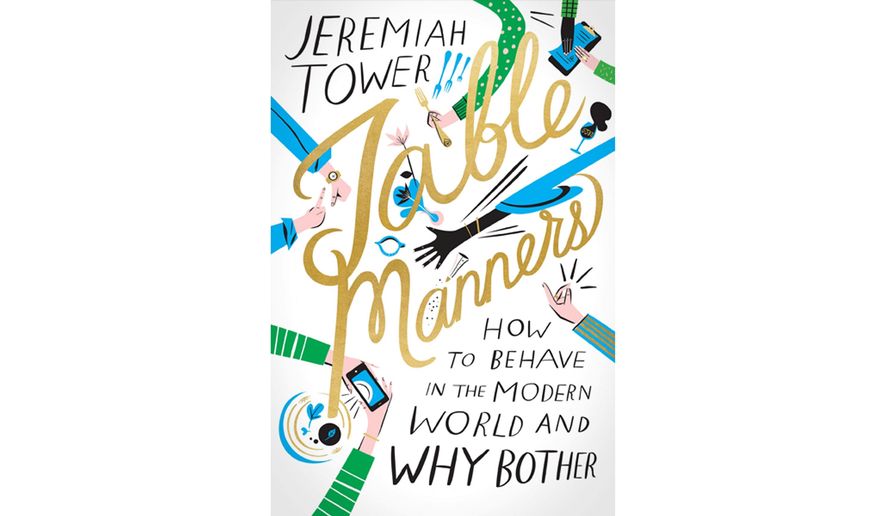OPINION:
TABLE MANNERS: HOW TO BEHAVE IN THE MODERN WORLD AND WHY BOTHER
By Jeremiah Tower
Farrar, Straus and Giroux, $20, 148 pages, illustrated
Jeremiah Tower is one of this nation’s great restaurateurs of the past half century, as anyone such as myself who has been fortunate enough to eat in one of his establishments well knows. So it is not surprising that he brings some of that perspective to his forthright recipes for good table manners. But, for the most part, his focus is on you as diner, guest, or host, and how you should act for your own sake and that of others, for “Table manners are a two-way street.”
Pleasingly apparent in these pages is Mr. Tower’s authority, attractively leavened with suppleness and common sense, acknowledging change in mores, but embracing enduring standards of behavior, even when discussing selfies, texting or talking on a cellphone in company. How appropriate that one so familiar with credit cards defined by precious metals should have amended the Biblical Golden Rule thus: “You are always correct and safe from any embarrassing gaffes if you remember: do unto others as they would have you do.” For the aim of so much of the practical advice being dispensed here is to put everyone at their ease in order to promote maximum enjoyment across the spectrum of gustatory experience.
Which is not to say that this is an author reluctant to deliver a sharp rap across the knuckles when called for:
“Eating in a taxi is understandable only if you are taking one from Jersey to San Francisco. But if you are on a short ride and absolutely must, keep your breakfast in the bag and eat carefully over the opening of the bag, so the next passenger doesn’t slide in over a seat drenched in coffee, milk, sugar, and doughnut debris. Taking your trash with you is essential.”
And many an airline passenger will bless Mr. Tower for his admonition to spare those seated nearby “smelly, messy, spillable food” like raw garlic and consideration with beverages “at even a hint of turbulence.” On the other hand, his advice for those traveling on ships is all about ensuring great service for themselves.
Readers will find huge amounts of invaluable advice about everything from table settings to tackling hard to eat treats like giant lobsters or teeny snails. Sparing embarrassment and awkwardness are hallmarks of his tips, like the ones for cocktail party eats:
“Don’t serve anything that is more than a comfortable one-bite or it may end up down the front of a guest. A lamb chop, no matter how petite, is not an hors d’oeuvre.”
Or: “Never serve food hot enough to burn anyone’s mouth”
Or, treading a fine line regarding politeness: “Crab salad is one thing, crab breath another. Guests want to eat what they choose, not what they smell on another’s breath. Never use ingredients that linger, no matter how delicious.”
M.F.K. Fisher was famous for a book titled “With Bold Knife and Fork,” but Mr. Tower’s is bold in using a sharp tongue to dispense prescriptions and proscriptions.
All types of etiquette get their turn here, from who pays to how much to tip, and whether still to do so when a service charge has already been added. When using a marrow spoon is pretentious (when this delicacy is already spread on toast) and where necessary (when it is served still in its bone). And why it is more considerate both to you and your fellow diners to dab sauce onto your oyster than put the mollusk into the condiment.
It seems that few subjects are taboo for Mr. Tower, from bodily functions to allergies. After all, he is describing people as they are made and situations bound to arise. And he is adept at blending tolerance with absolute prohibition when called for:
“If the guests start using drugs that are not on the menu or entertainment schedule, a firm ‘Please, no,’ is within everyone’s bounds of best behavior.” Establishing a climate of comfort for all is the ultimate goal of good manners.
At the conclusion of his book, Mr. Tower returns to answering what lies behind that all-important subtitle: “The most important thing about manners is that they’re not about you. The more you think about those around you and the less you think about yourself, the more likely you are to behave well. And the better you behave, the more likely you are to be invited back.”
There is not only the sound practical advice readers will have come to expect by now, but, ironically, here as well as scattered throughout the text, as we have seen, plain, direct speaking that would not be social good manners by host or guest. In order to produce that uniformly good table behavior, Mr. Tower is not afraid to abandon manners and, in that uniquely private domain inhabited solely by author and reader, speak to him sternly, in the manner of what used to be called a “Dutch Uncle.”
• Martin Rubin is a writer and critic in Pasadena, Calif.




Please read our comment policy before commenting.